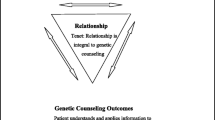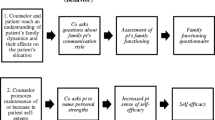Abstract
Motivational Interviewing is a well-described counseling method that has been applied to a broad range of health behavior encounters. Genetic counseling is an emerging area of utilization for the method of Motivational Interviewing. The relational and technical elements of the MI method are described within the context of genetic counseling encounters. Case excerpts will be used to illustrate incorporation of MI methods into the Reciprocal Engagement Model of the genetic counseling encounter.





Similar content being viewed by others
References
Aviram, A., & Westra, H. A. (2011). The impact of motivational interviewing on resistance in cognitive behavioral therapy. Psychotherapy Research, 21, 698–708.
Beutler, L. E., Harwood, T. M., Michelson, A., Song, X., & Holman, J. (2011). Resistance/reactance level. Journal of Clinical Psychology, 67, 133–142.
Chan, F. (2015). Counseling theories and techniques for rehabilitation and mental health counseling. New York: Springer.
Copeland, L., McNamara, R., Kelson, M., & Simpson, S. (2015). Mechanisms of change within motivational interviewing in relation to health behaviors outcomes: a systematic review. Patient Education and Counseling, 98, 401–411.
Daly, M. (2014). Breast cancer risk counseling: a teachable moment? Journal of the National Comprehensive Cancer Network, 12, 1361–1362.
Dunn, C., Deroo, L., & Rivara, F. (2001). The use of brief interventions adapted from motivational interviewing across behavioral domains: a systematic review. Addiction, 96, 1725–1742.
Gaume, J., Gmel, G., Fouzi, M., & Daeppen, J. B. (2008). Counsellor behaviors and patient language during brief motivational interpretations: a sequential analysis of speech. Addiction, 103, 1793–1800.
Geus de, E., Eijzenga, W., Menko, F. H., Sijmons, R. H., deHaes, H. C. J. M., Aalfs, C., & Smets, E. (2016). Design and feasibility of an intervention to support cancer genetic counselees in informing their at-risk relatives. Journal of Genetic Counseling, 25, 1179–1187.
Glynn, L., & Moyers, T. (2010). Chasing change talk: the clinican's role in evoking client language about change. Journal of Substance Abuse Treatment, 39, 65–70.
Hartzler, B., Beadnell, B., & Rosengren, D. (2010). Deconstructing proficiency in motivational interviewing: mechanics of skilful practitioner delivery during brief simulated encounters. Behavioural and Cognitive Psychotherapy, 38, 611–628.
Hettema, J., Steele, J., & Miller, W. R. (2005). Motivational interviewing. Annual Review of Clinical Psychology, 1, 91–111.
Karno, M. P., & Longabaugh, R. (2005). An examination of how therapist directiveness interacts with patient anger and reactance to predict alcohol use. Journal of Studies on Alcohol, 66, 825–832.
Knight, K. M., McGowan, L., Dickens, C., & Bundy, C. (2006). A systematic review of motivational interviewing in physical health care settings. British Journal of Health Psychology, 11, 319–332.
Linehan, M. (1997). Validation and psychotherapy. In L. S. Greenberg & A. C. Bohart (Eds.), Empathy reconsidered: new directions in psychotherapy (pp. 353–392). Washington DC: American Psychological Association.
Lundahl, B., Moleni, T., Burke, B., Butters, R., Tollefson, D., Butler, C., & Rollnick, S. (2013). Motivational interviewing in medical care settings: a systematic review and meta-analysis of randomized controlled trials. Patient Education and Counseling, 93, 157–168.
Martins, R. K., & McNeil, D. W. (2009). Review of motivational interviewing in promoting health behaviors. Clinical Psychology Review, 29, 283–293.
McCarthy Veach, P., Bartels, D. M., & LeRoy, B. S. (2007). Coming full circle: a reciprocal-engagement model of genetic counseling practice. Journal of Genetic Counseling, 16, 713–728.
Michie, S., Abraham, C., Whittington, C., McAteer, J., & Gupta, S. (2009). Effective techniques in healthy eating and physical activity interventions: A meta-regression. Health Psychology, 28(6), 690–701.
Miller, W. (2012). Equipoise and equanimity in motivational interviewing. Motivational Interviewing: Training, Research, Implementation, Practice, 1, 31–32.
Miller, W. R., & Rollnick, S. (2009b). Ten things motivational interviewing is not. Behavioural and Cognitive Psychotherapy, 37, 129–140.
Miller, W., & Rollnick, S. (2013). Motivational interviewing: helping people change (3rd ed.). New York: Guilford Press.
Miller, W. R., & Rose, G. S. (2009a). Towards a theory of motivational interviewing. American Psychologist, 64, 27–37.
Morton, K., Beauchamp, M., Prothero, A., Joyce, L., Saunders, L., Spencer-Bowdage, S., Dancy, B., et al. (2015). The effectiveness of motivational interviewing for health behavior change in primary care settings: a systematic review. Health Psychology Review, 9, 205–223.
Moyers, T., Martin, T., Manuel, J., Hendrickson, S., & Miller, W. R. (2005). Assessing competence in the use of motivational interviewing. Journal of Substance Abuse Treatment, 28, 19–26.
Redlinger-Grosse, K., Veach, P. M., Cohen, S., LeRoy, B. S., MacFarlane, I. M., & Zierhut, H. (2015). Defining our clinical practice: the identification of genetic counseling outcomes utilizing the reciprocal engagement model. Journal of Genetic Counseling, 25, 239–257.
Reihl, J. P., & Roy, C. (1980). Conceptual models for nursing practice (Second ed.). Norwalk: Appleton Century Crofts.
Resnicow, K., & McMaster, F. (2012). Motivational interviewing: moving from why to how with autonomy support. International Journal of Behavioral Nutrition and Physical Activity, 9, 9–19.
Rogers, C. R. (1986). Carl Rogers on the development of the person-centered approach. Person Centered Review, 1, 257–259.
Rollnick, S., Miller, W. R., & Butler, C. (2008). Motivational interviewing in health care: helping patients change behavior. New York: Guilford Press.
Rubak, S., Sandbaek, A., Lauritzen, T., & Christensen, B. (2005). Motivational interviewing: a systematic review and meta-analysis. British Journal of General Practice, 55, 305–312.
VanBuskirk, K., & Wetherell, J. L. (2014). Motivational interviewing used in primary care a systematic review and meta-analysis. Journal of Behavioral Medicine, 37, 768–780.
Waldron, H. B., & Miller, W. R. (2001). Client anger as a predictor of differential response to treatment. In W. P. Longabaugh (Ed.), R, Project MATCH hypotheses: Results and causal chain analyses (pp. 134–148). Bethesda: National Institute on Alcohol Abuse and Alcoholism.
Westra, H., & Aviram, A. (2013). Core skills in motivational interviewing. Psychotherapy, 50, 273–278.
Zahm, K. W., Veach, P. M., Martyr, M. A., & LeRoy, B. S. (2015). From novice to seasoned practitioner: a qualitative investigation of genetic counselor professional development. Journal of Genetic Counseling, 25, 818–834.
Acknowledgements
Sincerest gratitude to Kriss Haren, MA RHC III, Claire Davis, MS CGC, and Daniela Iacoboni, MS CGC for their reviews and edits on the manuscript.
Author information
Authors and Affiliations
Corresponding author
Ethics declarations
Conflict of Interest
Erin Ash declares that she has no conflict of interest.
Human Studies and Informed Consent
No human studies was carried out by the author for this article.
Animal Studies
No animal studies was carried out by the author for this article.
Rights and permissions
About this article
Cite this article
Ash, E. Motivational Interviewing in the Reciprocal Engagement Model of Genetic Counseling: a Method Overview and Case Illustration. J Genet Counsel 26, 300–311 (2017). https://doi.org/10.1007/s10897-016-0053-8
Received:
Accepted:
Published:
Issue Date:
DOI: https://doi.org/10.1007/s10897-016-0053-8




